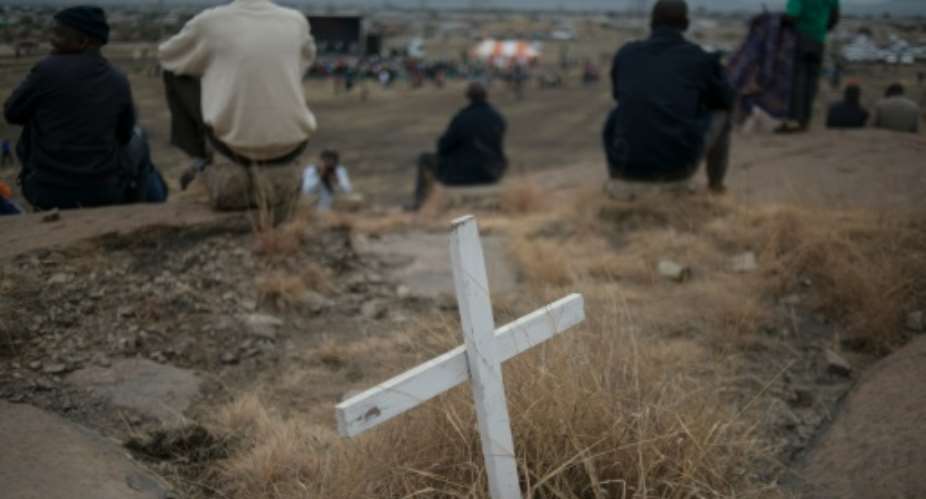Johannesburg (AFP) - The South African government is to pay damages to victims of a 2012 police shooting that left 34 mineworkers dead and dozens wounded, the presidency said Thursday.
In a victory for the victims and their families, the government said it was "ready to make an offer to settle these claims in the next few months".
The announcement comes two days after the four-year anniversary of the killings in which the miners were gunned down after police were deployed to break up a wildcat strike that had turned violent at the Lonmin-owned Marikana platinum mine northwest of Johannesburg in August 2012.
It was the worst police violence in South Africa since the end of apartheid 21 years ago.
"Government is currently in the process of determining the quantum and will make offer of payments in full settlement of claims," said a statement issued by the president's office.
Presidential spokesman Bongani Ngqulunga told AFP that there were 34 claims for loss of support, 81 for injuries suffered during the shooting, and 275 for unlawful arrest. Some of the claims overlap, he added.
Last year families of the victims lodged compensation claims against the government, listing a total of 326 dependents as having been affected by the violence.
An official inquiry established by President Jacob Zuma put much of the blame for the massacre on police tactics used to disperse the strikers, but it did not go as far as recommending compensation.
George Bizos, one of the lawyers that represented the affected families during the Marikana inquiry would have preferred for the families to receive "temporary relief" while the compensation amounts were being finalised.
"We welcome the statement, but I am concerned that it's going to take another few months for the widows that have had nothing for the past over years," Bizos told AFP.
"I appeal to those responsible that the matter is a matter of urgency and I hope that they take immediate steps of a temporary nature," said Bizos, who represented Nelson Mandela during the Rivonia Trial that sentenced the anti-apartheid icon to life in prison.
Ten other people were killed in the days preceding the Marikana incident, including two police officers and four non-striking workers.





 Supreme court declares payment of wages to spouses of President, Vice President ...
Supreme court declares payment of wages to spouses of President, Vice President ...
 Publish full KPMG report on SML-GRA contract – Bright Simons to Akufo-Addo
Publish full KPMG report on SML-GRA contract – Bright Simons to Akufo-Addo
 Kumasi International Airport to begin full operations by end of June
Kumasi International Airport to begin full operations by end of June
 Election 2024: Our ‘real challenge’ is getting ‘un-bothered’ youth to vote – Abu...
Election 2024: Our ‘real challenge’ is getting ‘un-bothered’ youth to vote – Abu...
 [Full text] Findings and recommendations by KPMG on SML-GRA contract
[Full text] Findings and recommendations by KPMG on SML-GRA contract
 Renegotiate SML contract – Akufo-Addo to GRA, Finance Ministry
Renegotiate SML contract – Akufo-Addo to GRA, Finance Ministry
 J.B Danquah-Adu murder trial: Sexy Dondon to Subpoena Ken Agyapong, Ursula Owusu
J.B Danquah-Adu murder trial: Sexy Dondon to Subpoena Ken Agyapong, Ursula Owusu
 Galamsey: Five Burkinabes jailed 20 years each for mining
Galamsey: Five Burkinabes jailed 20 years each for mining
 'It's no crime' – Abu Sakara defends Alan's exit from NPP
'It's no crime' – Abu Sakara defends Alan's exit from NPP
 'We know all your houses, pay your bills now or we’ll disconnect you; we're all ...
'We know all your houses, pay your bills now or we’ll disconnect you; we're all ...
